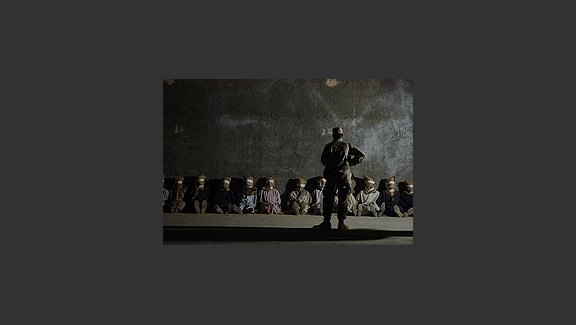The Road to Guantanamo
Synopsis
Shafiq Rasul, Asif Iqbal and Ruhel Ahmed grew up in the West Midlands town of Tipton. Shafiq's and Asif's parents were first-generation Pakistanis; Ruhel's were Bengali. As teenagers, Ruhel and Asif were best friends, often in trouble at school and with the police, for offences ranging from shoplifting to fraud. Older than the other two, Shafiq was better behaved, but didn't take work seriously. All three led typical small-town lives, smoking dope and chasing girls. At the end of their teens, they began to go to mosque with friends, more to pass the time than from strongly held religious beliefs. Ruhel and Asif worked together in the mailroom of a local company. Shafiq looked after his father who was dying of cancer, before enrolling at university, supporting himself with a job at Currys.
In August 2001, Asif's parents arrange for him to be married in a village near Faisalabad, in the Punjab province. Asif (19) reluctantly accepts, and on 20 September flies to Pakistan to finish the preparations. Ruhel (19) agrees to be his best man, and arrives in Karachi, along with Shafiq (23) and another friend from Tipton, Monir (21), where they are met by Shafiq's Pakistani cousin, Zahid (27) and Asif. After a couple of days on the beach and in the arcades, they visit a mosque where a preacher calls for volunteers to travel to Afghanistan as part of an aid effort. All five sign up, and catch a bus set for Kandahar the next evening. After a night's travelling, the convoy arrives in Quetta, in north-west Pakistan, where their coach hits and kills a man, and their driver runs away. Along with the other volunteers, the five cross the border into Afghanistan. They reach Kandahar around midnight, just as the first US bombs begin to fall in the distance. They are given shelter at a Taliban checkpoint.
The next day, the convoy travels to the capital, Kabul. Asif becomes very ill, and visits a doctor. The five men spend their time wandering around the city, and handing out their money to people in the street and in hospitals. Bombing continues in the mountains around them. Anxious to return to Pakistan, they board a taxi, which takes them however to a hut in the hills around Kundoz in the north. They learn they have become trapped in one of the last remaining Taliban strongholds, and are surrounded by the notorious Northern Alliance troops, led by General Dostum. The city is bombed daily by US planes, and the Taliban forces stream into town, but after two weeks, a truce is negotiated through the UN. Monir takes the opportunity to jump on a truck headed for Mazar-e-Sharif. He is never heard from again, assumed to have been killed in the clashes between Taliban prisoners and Northern Alliance soldiers at Kalai Janghi fort.
The four others are told that foreigners have been granted safe passage, so they board a truck headed for Kandahar in the night. The convoy of trucks is bombed by US fighter planes, killing or maiming most of the passengers. The four survive, only to be captured by Northern Alliance troops. Along with hundreds of other prisoners, they are tied up and herded into airtight metal containers, where they begin to suffocate. The Northern Alliance troops fire into the containers, including Asif's, killing most of those inside.
The four men are detained at Sheberghan prison for 10 days, and are visited by Red Cross officials, who notify the British embassy in Karachi. However, on 28 December, US forces policing the prison take the three Britons, and fly them to a detention centre at Kandahar air base, where they are beaten and interrogated, by both US soldiers and the SAS. Zahid is left behind, and eventually imprisoned in Pakistan.
On 13 January 2002, Asif and Shafiq are taken to Guantánamo Bay in Cuba, where they become detainees in the open-air cages at Camp X-Ray. Ruhel joins them on 10 February. A few months later, they are moved to the newly-built Camp Delta, a prison comprising of metal containers. During their incarceration, all three are interrogated by the US and MI5, tortured hundreds of times, and accused of countless offences. In May 2003, a video is discovered of a rally attended by Osama bin Laden and Mohammed Atta, the leader of the September 11 hijackers, at which the FBI claim to have spotted the Tipton Three. Luckily, all three have airtight alibis - Shafiq was working at Currys, and Asif and Ruhel were on parole.
Eventually, on 5 March 2004, after over two years at Guantánamo, the Tipton Three are taken back to England, and interrogated in London by the Anti-Terrorist squad at Paddington Green station. The next day they are released without charge.
Details
- Year
- 2007
- Type of film
- Features
- Running Time
- 93 mins
- Format
- DVCam, HiDef
- Director
- Michael Winterbottom, Mat Whitecross
- Producer
- Lee Thomas, Tessa Ross
- Co-Producer
- Lee Thomas, Tessa Ross
- Editor
- Mat Whitecross
- Screenwriter
- Michael Winterbottom
- Director of Photography
- Marcel Zyskind
- Production Designer
- Mark Digby
- Sound
- Stewart Wilson, Joakim Sundstrom
- Music
- Molly Nyman, Harry Escott
- Principal Cast
- Rizwan Ahmed, Farhad Harun, Waqar Siddiqui, Arfan Usman, Ruhel Ahmed, Asif Iqbal, Shafiq Rasul
Genre
Production status
Complete
Please let us know if we need to make any amendments to this Film entry mailing us directly at
Last updated 20th February 2006


